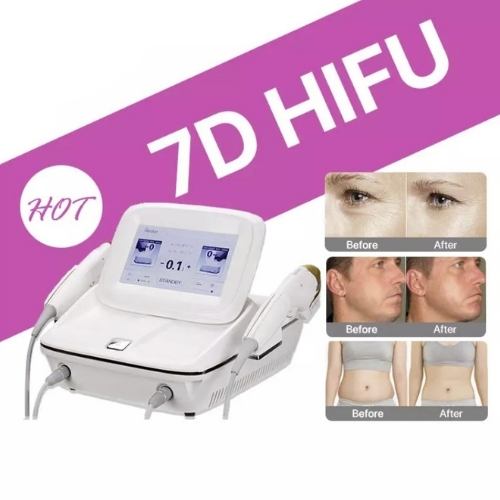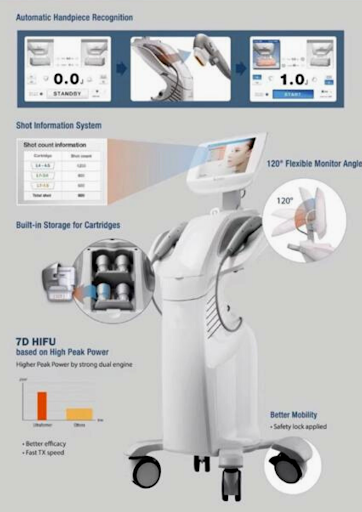What is HIFU, and why is it so popular?
HIFU (High Intensity Focused Ultrasound) is one of the most popular non-invasive body contouring methods on the market, and can be found in most large aesthetic clinics across the UK and other major nations.
The treatment involves passing short and high-intensity bursts of ultrasound waves into a patient’s skin. This heats the deeper layers of the skin and causes small amounts of damage to these tissues. When the body realises that these deep skin tissues need repairing, it produces extra collagen to aid cell regrowth. Collagen is what keeps skin tight and smooth, so this extra collagen boost gives the results of a facelift without any risky or painful surgery.
One 2019 study found that of 73 women and 2 men who had professional HIFU treatments done, physicians reported an 80% improvement in tightness and appearance of skin on the face and neck, and over 78% of patients reported themselves as being completely satisfied with the treatment.
HIFU is no doubt a fantastic technology, and you may be keen to integrate it into your clinic’s aesthetic repertoire. The HIFU machine market is broad and vast, so deciding on a machine may be quite daunting, especially as high end devices come at a high-end price point.

What are the low-cost HIFU options?
In your research you may have noticed that there are many devices at a noticeably lower price point. These machines are typically manufactured in China, can be found on ecommerce websites such as alibaba.com, and are small enough that they can be shipped to you for a low cost.
HIFU is a complex technology, and it is not easy or cheap to manufacture one of these machines. If a company is selling them for a cheap price, that means that they have cut corners during manufacturing, quality control, or efficiency of treatment. The worst risk you are exposed to is that they have cut corners on safety checks. In this article we will explain how the manufacturers of these machines make wild claims about their efficacy, and how while you may be saving money in the short term, you could be subjecting your clients to risk that could lead to lost business, reputation, or even lawsuits.
“Some manufacturers are producing outwardly exact copies of recognised machines but without really understanding the way the technology works or what the frequency and output should be,” says Dean Nathanson, managing director of UK-based machine manufacturer Caci International. “Technologies like ultrasound, laser, HIFU or cryolipolysis can do serious damage if not applied properly and if the output isn’t what it should be.”
Aesthetics expert Lee-Ann Palmer adds “Unfortunately, the UK beauty industry lacks regulation. The integrity of the HIFU system itself is based on several factors such as the clinical preliminary studies used during the research and development stage, approval by an independent body that certifies the system and of course comprehensive clinical training on how to operate and maintain the systems”.

This manufacturer’s device looks sleek, well designed and professional. It may also look a little familiar…
That would be because that device is an Ultraformer III. The Ultraformer III is a fantastic HIFU machine, and arguably one of the best on the market, however it is manufactured by Classys, not this company.
In fact, this company has been using Ultraformer devices with the logo poorly erased in order to sell their own inferior devices, which would probably look a lot less desirable in advertisements.
One thing is for sure, if you were to buy from this company, the device you receive will not look as advertised.
What is 4D HIFU?
As opposed to regular HIFU, machines that can also provide 4D HIFU can focus the ultrasound at a customisable treatment depth. The fact that 4D HIFU treatment can reach the SMAS layer, makes it the most effective treatment in the stimulation and renewal of the skin’s collagen.
What is 5/6/7/8/9D HIFU?
These are largely made up terms which are commonly used by cheap machine manufacturers. You might think you’re getting an extra five “Ds” with a 9D machine, but that’s unfortunately not how it works!
What if this is the only HIFU machine I can afford?
The bottom line is if you cannot afford a safe HIFU machine, you should not buy a HIFU machine.
You might be able to get away with buying a cheap equivalent of a massage gun, or treatment table for your clinic if you’re somewhat strapped for cash, but a HIFU machine alters the appearance of the face or body by boosting collagen and sometimes reducing fat underneath, depending on the treatment depth. Although it is a non-invasive treatment, it is one in which damage could be done to the patient’s face or body if the practitioner was using a cheap or poorly calibrated machine.
Venn Healthcare does have rental options if the upfront cost of the device is the issue, as well as other financing options. Contact us for more information.
What are some recommended HIFU devices?
We’ve written a great article on the best professional HIFU machines. It compares HIFU machines based on what would fit best for your clinical needs.
We would suggest you give it a read, and if you have any questions about HIFU, financing options, or need further help deciding on which machine to purchase, drop our team a message on the contact page and one of our aesthetic experts will reach out to help.




